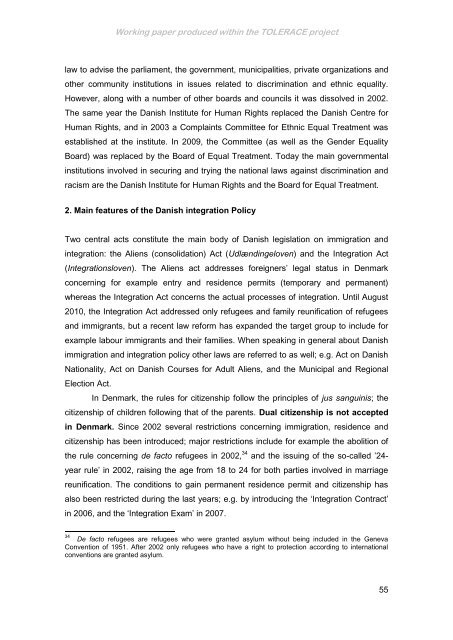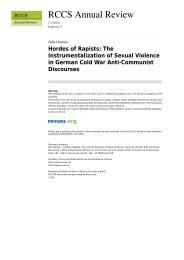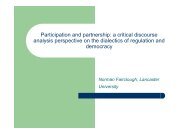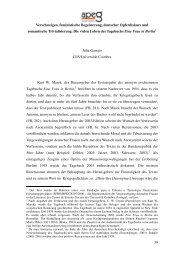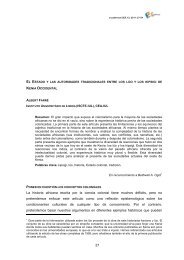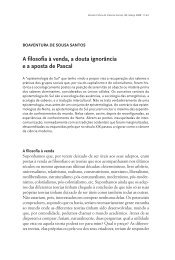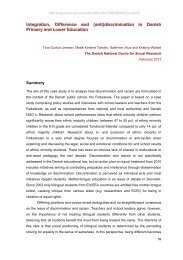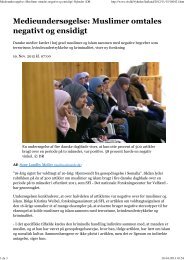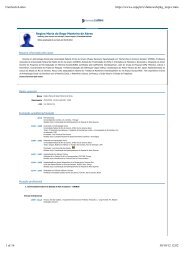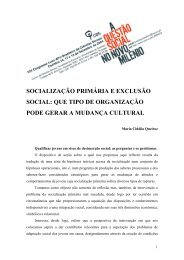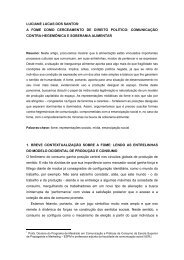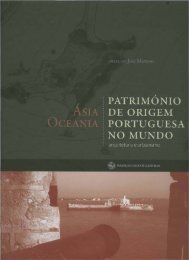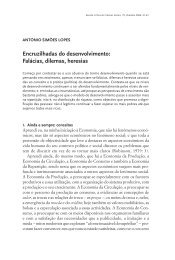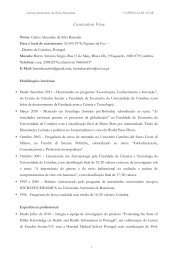Analysis of Integration Policies and Public State-Endorsed ...
Analysis of Integration Policies and Public State-Endorsed ...
Analysis of Integration Policies and Public State-Endorsed ...
Create successful ePaper yourself
Turn your PDF publications into a flip-book with our unique Google optimized e-Paper software.
Working paper produced within the TOLERACE project<br />
law to advise the parliament, the government, municipalities, private organizations <strong>and</strong><br />
other community institutions in issues related to discrimination <strong>and</strong> ethnic equality.<br />
However, along with a number <strong>of</strong> other boards <strong>and</strong> councils it was dissolved in 2002.<br />
The same year the Danish Institute for Human Rights replaced the Danish Centre for<br />
Human Rights, <strong>and</strong> in 2003 a Complaints Committee for Ethnic Equal Treatment was<br />
established at the institute. In 2009, the Committee (as well as the Gender Equality<br />
Board) was replaced by the Board <strong>of</strong> Equal Treatment. Today the main governmental<br />
institutions involved in securing <strong>and</strong> trying the national laws against discrimination <strong>and</strong><br />
racism are the Danish Institute for Human Rights <strong>and</strong> the Board for Equal Treatment.<br />
2. Main features <strong>of</strong> the Danish integration Policy<br />
Two central acts constitute the main body <strong>of</strong> Danish legislation on immigration <strong>and</strong><br />
integration: the Aliens (consolidation) Act (Udlændingeloven) <strong>and</strong> the <strong>Integration</strong> Act<br />
(<strong>Integration</strong>sloven). The Aliens act addresses foreigners‘ legal status in Denmark<br />
concerning for example entry <strong>and</strong> residence permits (temporary <strong>and</strong> permanent)<br />
whereas the <strong>Integration</strong> Act concerns the actual processes <strong>of</strong> integration. Until August<br />
2010, the <strong>Integration</strong> Act addressed only refugees <strong>and</strong> family reunification <strong>of</strong> refugees<br />
<strong>and</strong> immigrants, but a recent law reform has exp<strong>and</strong>ed the target group to include for<br />
example labour immigrants <strong>and</strong> their families. When speaking in general about Danish<br />
immigration <strong>and</strong> integration policy other laws are referred to as well; e.g. Act on Danish<br />
Nationality, Act on Danish Courses for Adult Aliens, <strong>and</strong> the Municipal <strong>and</strong> Regional<br />
Election Act.<br />
In Denmark, the rules for citizenship follow the principles <strong>of</strong> jus sanguinis; the<br />
citizenship <strong>of</strong> children following that <strong>of</strong> the parents. Dual citizenship is not accepted<br />
in Denmark. Since 2002 several restrictions concerning immigration, residence <strong>and</strong><br />
citizenship has been introduced; major restrictions include for example the abolition <strong>of</strong><br />
the rule concerning de facto refugees in 2002, 34 <strong>and</strong> the issuing <strong>of</strong> the so-called ‘24-<br />
year rule‘ in 2002, raising the age from 18 to 24 for both parties involved in marriage<br />
reunification. The conditions to gain permanent residence permit <strong>and</strong> citizenship has<br />
also been restricted during the last years; e.g. by introducing the ‗<strong>Integration</strong> Contract‘<br />
in 2006, <strong>and</strong> the ‗<strong>Integration</strong> Exam‘ in 2007.<br />
34 De facto refugees are refugees who were granted asylum without being included in the Geneva<br />
Convention <strong>of</strong> 1951. After 2002 only refugees who have a right to protection according to international<br />
conventions are granted asylum.<br />
55


